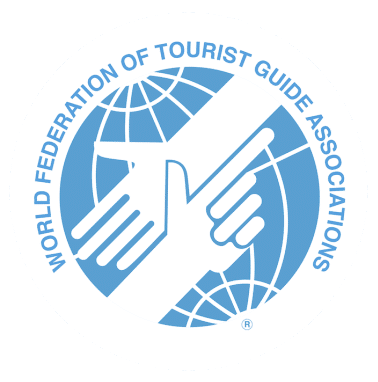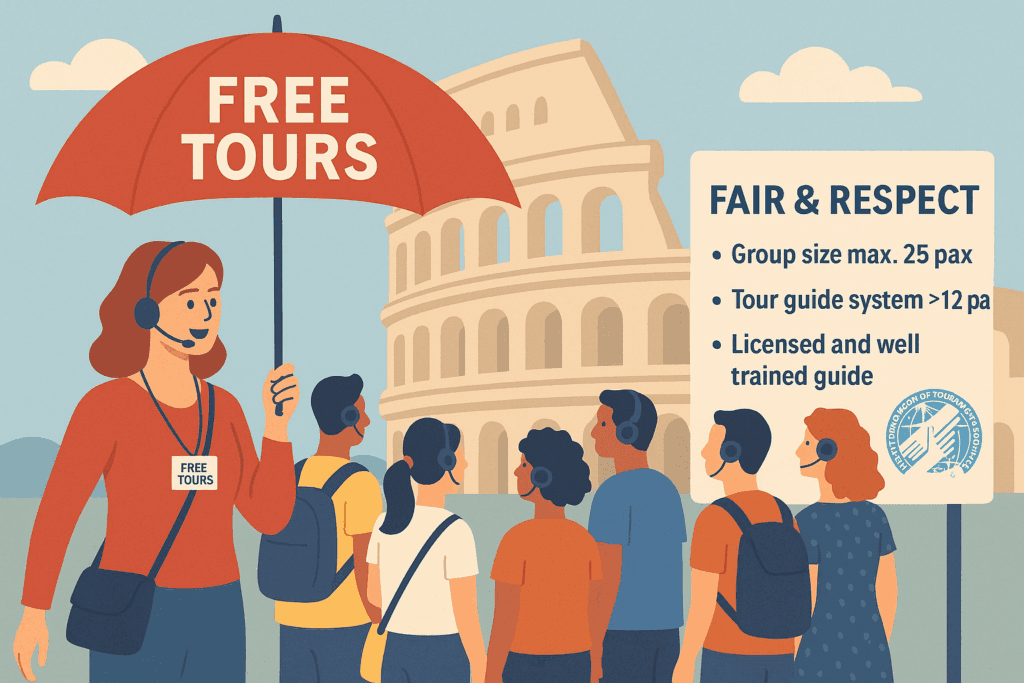In recent years, Free Tours have become a familiar feature in urban tourism landscapes worldwide. What began as an innovative, customer-oriented model—offering “pay-what-you-like” walking tours—has grown into a global phenomenon. These tours, often promoted via digital platforms with impressive marketing strategies and social media reach, have succeeded in capturing a significant market share.
At the World Federation of Tourist Guide Associations (WFTGA), we believe it is time for a nuanced, respectful and critical dialogue on this topic—one that recognises both the strengths and the challenges Free Tours bring to our profession, our destinations, and our shared values.
Respect Where It’s Due
Free Tour operators have undoubtedly identified a market niche and responded with entrepreneurial skill, particularly in the fields of digital marketing, storytelling, and customer engagement. Many are highly professional in how they build and brand their offerings. The idea of allowing guests to decide the value of a tour based on their experience is, at face value, democratic and guest-centred.
Some Free Tour guides are passionate, well-informed, and eager to offer engaging experiences. Where these guides are properly trained, culturally sensitive, and ethically grounded, we welcome their contribution to a vibrant, inclusive tourism ecosystem.
But Tourism is Not a Joke
However, we must clearly differentiate between entertainment and profession. A Tourist Guide is not simply a performer or anecdote-teller. In many countries, guiding is a recognised and protected profession—one that requires formal training, certification, and compliance with legal and ethical standards. Professional Tourist Guides offer context, depth, critical thinking, and cultural sensitivity. They interpret not just landmarks, but lived experiences, identities, and history. They serve as agents of the SDGs.
A tour that focuses only on cheap laughs and instagrammable moments does not meet the goals of SDG 4 (Quality Education), SDG 11 (Sustainable Cities and Communities) or SDG 16 (Peace, Justice and Strong Institutions). And if a guide is undertrained or misinformed, they may—even unintentionally—perpetuate stereotypes, misinformation, or disrespect local sensitivities.
The Problem of (Un)Fair Pay
The most serious concern with Free Tours remains the lack of financial transparency and fair payment. While some guides report earning more through tips than fixed-fee tours, the principle of “work first, maybe get paid later” undermines the dignity of professional labour. This model implicitly devalues the skill, responsibility, and preparation required for excellent guiding.
“When we reduce professional guiding to a tip-based gamble, we send a dangerous message about the value of expertise, cultural knowledge, and educational responsibility. A surgeon doesn’t work for tips. A teacher doesn’t work for tips. Why should a Tourist Guide—who shapes visitors’ understanding of entire cultures and communities—work without guaranteed compensation? This isn’t just about money; it’s about recognising guiding as the skilled profession it truly is.”
Sebastian Frankenberger, President, World Federation of Tourist Guide Associations
WFTGA supports SDG 8 (Decent Work and Economic Growth) and calls for all guiding services to offer fair and predictable compensation. Paying a Tourist Guide should not be a gamble—it is a matter of respect and sustainability.
What Can We Learn from Free Tours?
Free Tour platforms often excel in user experience and emotional storytelling. Their communication is casual, direct, and often very guest-friendly. This is something traditional guiding structures can and should reflect upon. In our training programmes, we are increasingly focused on storytelling techniques, audience engagement, and avoiding “Wikipedia on two legs” guiding.
We do not advocate for gimmicks. But we do encourage guides to evolve—without sacrificing depth or dignity.
Social and Environmental Responsibility
We also urge Free Tour operators to acknowledge their responsibilities:
- Pay taxes and follow local laws
- Limit group sizes to 20–25 people, especially in destinations suffering from overtourism (e.g., Spain, Italy)
- Use tour guide systems (whisper systems) for groups of 12+, to reduce noise pollution
- Avoid overexposing sensitive locations simply because they are “photo-worthy”
- Respect local communities, not just tourist preferences
If the guiding sector is to support SDG 12 (Responsible Consumption and Production) and SDG 13 (Climate Action), these behaviours must become standard.
Constructive Proposals – Not Bans
WFTGA is not calling for prohibitions. Instead, we call for:
- Registration requirements of guests for all Free Tours to avoid overcrowding and unmanaged activity
- Adherence to local guiding laws—only certified guides should lead groups in regulated areas
- Universal adoption of a shared Code of Conduct for all guides, regardless of business model
- Opportunities for ongoing training, so that all guides—paid or tipped—can meet professional standards
A Shared Responsibility
We also challenge Destination Management Organisations (DMOs) and tourism boards to reflect: Why are Free Tours often promoted more visibly than licensed guides? Fairness and professionalism must guide policy and marketing strategies. And on the other hand every guide—regardless of affiliation—should have access to continuous training, be invited to industry dialogues, and be treated with the respect the profession deserves.
WFTGA: Partner for Dialogue and Solutions
The WFTGA is committed to building bridges—not barriers. We invite Free Tour platforms, tourism authorities, and guide associations to engage in constructive dialogue. We offer:
- Advisory services to guide associations on how to deal with Free Tours
- Webinars and roundtables on sustainable guiding models
- Training modules on guest engagement, ethics, and SDG-based guiding
- Cooperation with DMOs to build fair and inclusive tourism systems
Guiding is a profession. Tourism is a shared space. Sustainability is a common goal.
We believe in mutual respect, constructive cooperation, and clear, fair standards.
A Tourist Guide’s voice should never be free—it should be valued.

